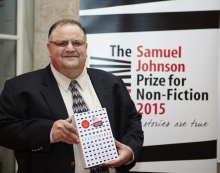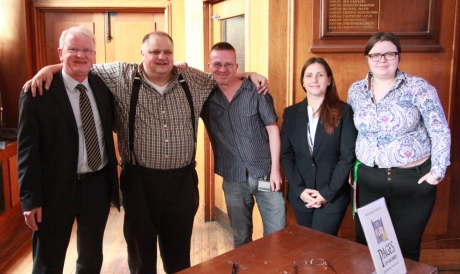Past, present and future autism research explored at Able@Imperial lecture

This week, the College's staff network for disability and mental health hosted a fascinating guest lecture about the history of autism research.
Best-selling US author and investigative journalist Steve Silberman took the audience on a journey from the fraught early days of autism classification through to the recent times and the concept of neurodiversity.
Through his investigations Steve has uncovered a harrowing and largely unknown history of autism. He highlighted early work into autism in 1930s Vienna, led by Hans Asperger, which was surprisingly progressive – both in terms of classifying a broader 'continuum' of autism disorders and a holistic, enlightened way of caring for those affected.
Companies all over the world are starting to realise that autistic people can make productive, valuable and loyal employees
– Steve Silberman
Journalist and author
Tragically, this work – and the autism community as a whole – was brutally and violently suppressed by the Nazis under the Action T4 programme of forced euthanasia.
Autism studies essentially resumed in the US in the 1940s drawing on earlier work, but through a far more narrow and medicalised view of the disorder, Steve argued. He says this has contributed to various problems and setbacks for the community, particularly in the US – such as wholesale stigmatisation, the assigning of blame to parents, lifelong institutionalisation and misguided research into finding 'cures' for autism.
Fortunately, this was followed by a renaissance in understanding of the autism spectrum in Europe, starting with the validation of Asperger Syndrome as a diagnostic entity by English cognitive psychologist husband and wife team Lorna and John Wing.
 Steve finished by talking about the empowerment of the autistic community in recent decades, partly through the internet – a ‘native communication medium’ for people who struggle with body language, tone of voice and other cues – and also through the concept of ‘neurodiversity’ coined by Australian activist Judy Singer to encompass autism spectrum disorders as well as diagnoses such as dyslexia.
Steve finished by talking about the empowerment of the autistic community in recent decades, partly through the internet – a ‘native communication medium’ for people who struggle with body language, tone of voice and other cues – and also through the concept of ‘neurodiversity’ coined by Australian activist Judy Singer to encompass autism spectrum disorders as well as diagnoses such as dyslexia.
“The term neurodiversity was really a rallying cry for other marginalised and stigmatized communities that she hoped would spread through the community and make people in the wider world think differently about them – in similar way as the ‘black is beautiful’ and ‘gay is good’ movements spread through their respective communities,” Steve said.
“Now what happening is that autistic role models are becoming more visible, which gives a very valuable vision of a practical, hopeful future for autistic kids. Also companies all over the world are starting to realise that autistic people can make productive, valuable and loyal employees provided that the right accommodations are made for them. We are at a pivotal moment in history where learning differences are being reframed from the disorder or medical model to the social model of disability.”
 Pictured L-R Professor James Stirling, Steve Silberman, Roddy Slorach (Senior Disability Advisor), Alexandra Williams (Able@Imperial rep), Sarah Shemilt (Able@Imperial Chair)
Pictured L-R Professor James Stirling, Steve Silberman, Roddy Slorach (Senior Disability Advisor), Alexandra Williams (Able@Imperial rep), Sarah Shemilt (Able@Imperial Chair)
Steve’s lecture was hosted by able@Imperial – a College network open to all disabled staff, staff who support disabled dependents, and staff who have an interest in disability in the workplace.
Imperial’s Provost Professor James Stirling was present for the event and thanked both Steve for taking the time out of his busy schedule to come to Imperial and Able@Imperial for organising and hosting the event.
“This is an important event for the College and I’m delighted to be here. In Imperial’s strategy for 2015-20 we set out a very clear commitment to promote inclusiveness, equality and diversity. This is not only about the people who are directly affected, but also about making the College a better place for everyone - because a community that is inclusive and supportive is likely to bemore engaged and more productive.”
A community that is inclusive and supportive is likely to be more engaged and more productive
– Professor James Stirling
Provost, Imperial College London
Professor Stirling went on to talk about his 30 year career working in mathematics and physics – a community that we now know has a relatively high proportion of people with autism spectrum traits.
“When I first started out in that environment, those terms simply weren’t used often, and if they were, there was a stigma attached to them. Yet, with the benefit of hindsight we now know that some of the greatest minds of the twentieth Century, such as the theoretical physicist and Nobel Laureate Paul Dirac, may well have displayed autistic traits.
“In recent years there been a transformation in our understanding of autism and we are now well on the way to the journey of providing appropriate support and removing any remaining stigma – thanks in part to the work of Steve and others.”
Chair of Able@Imperial Sarah Shemilt added: “It’s been a privilege to have Steve here today and talk about his work and how he has used his investigation skills to bring this story to light. The book that resulted from this research (“Neurotribes: The Legacy of Autism and the Future of Neurodiversity”) portrays a very relatable human story. I would like to thank in particular Roddy Slorach for arranging Steve to come and talk at the College, and the Equality, Diversity and Inclusion Unit for supporting us.
“Able@Imperial is open to all disabled staff, staff who support disabled dependents, and staff who have an interest in disability in the workplace. We aim to promote a positive culture around disability using the social model of disability. We host a regular series of events throughout the year and are always open and encourage people to come and join us on the committee.”
Find out more information about Able@imperial, click here: Able@Imperial
Article text (excluding photos or graphics) © Imperial College London.
Photos and graphics subject to third party copyright used with permission or © Imperial College London.
Reporter
Andrew Czyzewski
Communications Division